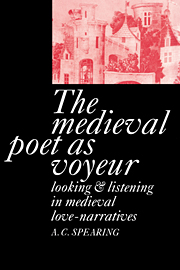Book contents
- Frontmatter
- Contents
- Preface
- 1 Theories of looking
- 2 Examples of looking
- 3 The Tristan story
- 4 Chrétien de Troyes
- 5 The Lanval story
- 6 Troilus and Criseyde and The Manciple's Tale
- 7 Partonope of Blois
- 8 The Knight's Tale and The Merchant's Tale
- 9 The Squyr of Lowe Degre
- 10 The Romaunt of the Rose
- 11 The Parliament of Fowls and A Complaynt of a Loveres Lyfe
- 12 The Palice of Honour and The Goldyn Targe
- 13 The Tretis of the Twa Mariit Wemen and the Wedo
- 14 Phyllyp Sparowe
- Notes
- Bibliography
- Index
- Frontmatter
- Contents
- Preface
- 1 Theories of looking
- 2 Examples of looking
- 3 The Tristan story
- 4 Chrétien de Troyes
- 5 The Lanval story
- 6 Troilus and Criseyde and The Manciple's Tale
- 7 Partonope of Blois
- 8 The Knight's Tale and The Merchant's Tale
- 9 The Squyr of Lowe Degre
- 10 The Romaunt of the Rose
- 11 The Parliament of Fowls and A Complaynt of a Loveres Lyfe
- 12 The Palice of Honour and The Goldyn Targe
- 13 The Tretis of the Twa Mariit Wemen and the Wedo
- 14 Phyllyp Sparowe
- Notes
- Bibliography
- Index
Summary
The most obvious motive for both secrecy and spying in medieval romance is an adulterous love-affair; and the first and most influential of the great medieval stories of adulterous love is that of Tristan and Iseult, the ‘one great European myth of adultery’, which in turn generated, by imitation and reaction, further stories of adulterous triangles, such as the Cligés of Chrétien, his Lancelot, and the many other versions of the story of Lancelot and Guenevere that succeeded it. The story of Tristan's love-affair with Iseult, the wife of his uncle and liege lord King Mark, probably of Celtic origin, emerges in French in the twelfth century, and survives in several different versions. The most famous in its own time was the Anglo-Norman poem by Thomas, but of this we have only a number of fragments; this version as a whole has to be reconstructed from the thirteenth-century texts that it influenced, including Gottfried von Strassburg's Tristan in Middle High German and Brother Robert's Tristrams saga in Old Norse. More useful for my purposes is the version of Beroul: representing a less courtly tradition than that of Thomas, and surviving only in a single incomplete manuscript, it nevertheless contains a substantial continuous section of the narrative, sufficient to permit exploration of its marked focus on watching and being watched.
Beroul's poem presents numerous scholarly and critical problems. It is not clear whether ‘Beroul’, about whom nothing is otherwise known, was indeed a single poet.
- Type
- Chapter
- Information
- The Medieval Poet as Voyeur , pp. 51 - 74Publisher: Cambridge University PressPrint publication year: 1993



